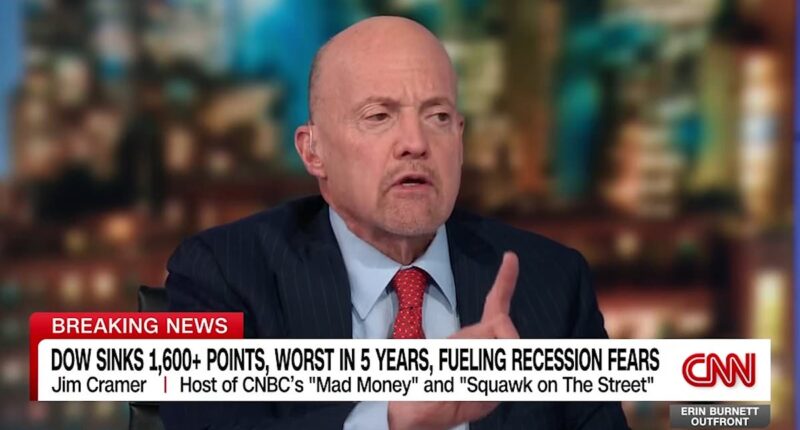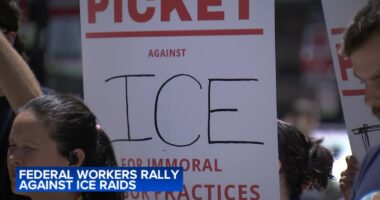
CNBC host Jim Cramer tore into President Trump as he watched widespread tariffs wreak havoc on the markets.
Cramer, who is known for his strong opposition to free trade, expressed feeling deceived on live television because he had initially supported Trump’s tariff plans under the assumption that they would be fair and reciprocal.
‘And that was gonna be so good, and I really believed in it,’ Cramer added. ‘I feel like a sucker tonight.’
‘I thought they were going to do something, and what’d they do? They cratered the damn stock market and gave us nothing.’
Prior to Trump announcing his series of tariffs, Cramer claims he was just as firm, if not more so, in advocating for them compared to Trump’s own trusted advisors.
‘But they screwed it up,’ Cramer continued.
He criticized the implementation of the tariffs as being poorly executed and expressed disappointment as a staunch believer that free trade negatively impacts American workers.
The remarks came hours after Trump introduced a wave of heavy tariffs impacting trade around the world, sending stock markets tumbling while companies including Stellantis announced layoffs.
Global markets reacted with panic at Trump’s tariff plan, with some 10 percent of major US stock indexes wiped off the books.
President Trump was on his Trump National Doral Miami golf course as the markets continued to struggle, leading him to fire off a number of social media posts aimed at calming fears over his plan.
Trump particularly focused on Chairman of the Federal Reserve, Jerome Powell, as he called for him to slash interest rates in response to the tariffs.
‘This would be a PERFECT time for Fed Chairman Jerome Powell to cut Interest Rates,’ the president posted.
Trump’s post continued: ‘{Powell] is always “late,” but he could now change his image, and quickly.
‘Energy prices are down, Interest Rates are down, Inflation is down, even Eggs are down 69%, and Jobs are UP, all within two months – A BIG WIN for America. CUT INTEREST RATES, JEROME, AND STOP PLAYING POLITICS!’
Earlier Friday, Powell held an eye-opening press conference where he warned Trump’s tariff plan would cause higher prices, job losses and lower growth.
Powell issued the chilling outlook as he said the central bank faces tough decisions ahead as it navigates the economic fallout.
Wall Street analysts had expected the Fed to go beyond its planned two rate cuts for 2025 as recession fears grow over the new tariffs.
But Powell said the central bank won’t make any moves until it has a clearer sense of the damage.
The Fed controls interest rates, which impact borrowing costs for families and businesses. It raises them to cool inflation and lowers them to spur growth.
Speaking to business journalists in Arlington, Va., Powell called the economic outlook ‘highly uncertain’ in light of the president’s newly announced reciprocal tariffs on Wednesday.
Powell did not address the selloff directly, but acknowledged that the same uncertainty engulfing investors and company executives was facing the Fed.
The Fed, he said, has time to wait for more data to decide how monetary policy should respond, but the central banks’ focus will be on ensuring that inflation expectations remain anchored, particularly if Trump’s import taxes touch off a more persistent jump in price pressures.
‘While tariffs are highly likely to generate at least a temporary rise in inflation, it is also possible that the effects could be more persistent,’ Powell said.
‘Avoiding that outcome would depend on keeping longer-term inflation expectations well anchored, on the size of the effects, and on how long it takes for them to pass through fully to prices. Our obligation is to keep longer-term inflation expectations well anchored and to make certain that a one-time increase in the price level does not become an ongoing inflation problem,’ he said.
He spoke as a top JPMorgan analyst today warned that the likelihood of a recession is now at 60 percent. The bank previously put its recession prediction at 40 percent.
Powell said it was not the Fed’s role to comment on the Trump administration’s policies but rather to react to how they might affect an economy that he and his colleagues regarded just a few weeks ago as being in a ‘sweet spot’ of falling inflation and low unemployment.
But his comments highlighted the tension the Fed is seeing emerge between ‘hard data’ that remains solid – the economy added 228,000 jobs in March with a 4.2% unemployment rate – and ‘soft data’ like surveys and interviews with business contacts that point to a coming slowdown.
‘We are closely watching this tension between the hard and soft data. As the new policies and their likely economic effects become clearer, we will have a better sense of their implications for the economy and for monetary policy,’ Powell said.

















